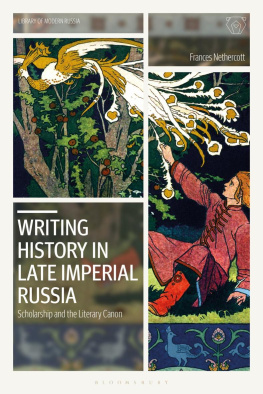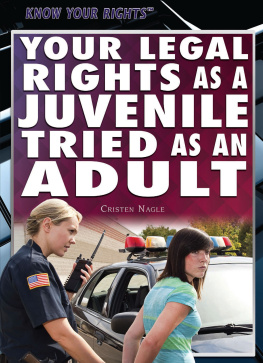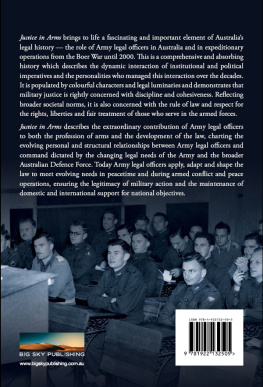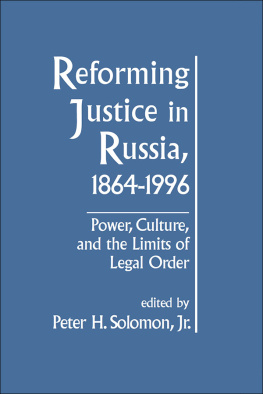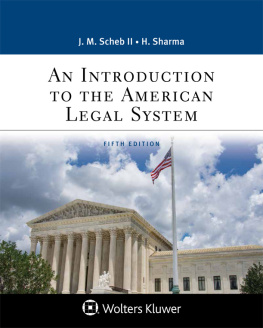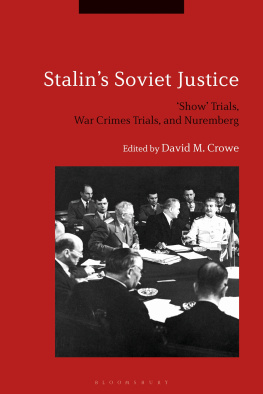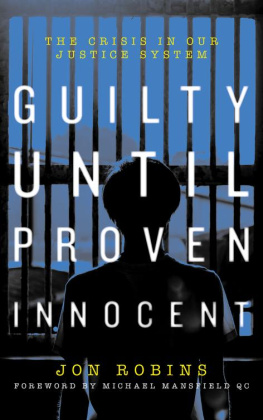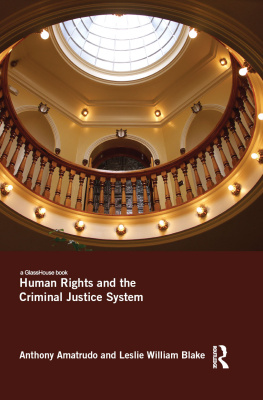Russian Legal Culture Before and After Communism
In late Imperial Russia and, again, in the immediate aftermath of communist rule, legal scholars were confronted by similar challenges in their efforts to modernize the countrys system of criminal justice. Inspired by some of the fundamental principles of classical liberalism, notably those designed to protect individual legal rights and freedoms, they endeavoured to promote juridical awareness and respect for law. For post-Soviet specialists, an integral part of this process has involved the recovery of an abandoned pre-Revolutionary legacy. Valued for their example as humanists and activists, past masters, such as Judge Koni, Nikolai Tagantsev, and one of Russias most celebrated nineteenthcentury thinkers, the moral philosopher Vladimir Solovev, have also earned posthumous recognition for the actuality of their ideas concerning the right to a dignified existence, the moral responsibilities of the judiciary, and the legal rights of the accused.
This book bridges two eras of legal reform. It examines competing theories of crime and the criminal, together with various prescriptions for punishment respecting personal inviolability. More broadly, by charting endeavours of the juridical community to promote legal culture through legislative reform and education, it throws light on aspects of politics, society, and mentality in two turbulent periods of Russian history.
Frances Nethercott is a Lecturer in Russian history at St Andrews University, UK. She specializes in intellectual and cultural history. Her previous publications include Une Rencontre Philosophique: Bergson en Russie, 19071917, and Russias Plato: Plato and the Platonic Tradition in Russian Education, Science and Ideology, 18401930.
BASEES/Routledge series on Russian and East European studies
Series editor:
Richard Sakwa, Department of Politics and International Relations, University of Kent
Editorial Committee:
Julian Cooper, Centre for Russian and East European Studies, University of Birmingham
Terry Cox, Department of Central and East European Studies, University of Glasgow
Rosalind Marsh, Department of European Studies and Modern Languages, University of Bath
David Moon, Department of History, University of Durham
Hilary Pilkington, Department of Sociology, University of Warwick
Stephen White, Department of Politics, University of Glasgow
Founding Editorial Committee Member:
George Blazyca, Centre for Contemporary European Studies, University of Paisley
This series is published on behalf of BASEES (the British Association for Slavonic and East European Studies). The series comprises original, highquality, research-level work by both new and established scholars on all aspects of Russian, Soviet, post-Soviet, and East European Studies in humanities and social science subjects.
1 Ukraines Foreign and Security Policy, 19912000
Roman Wolczuk
2 Political Parties in the Russian Regions
Derek S. Hutcheson
3 Local Communities and Post- Communist Transformation
Edited by Simon Smith
4 Repression and Resistance in Communist Europe
J.C. Sharman
5 Political Elites and the New Russia
Anton Steen
6 Dostoevsky and the Idea of Russianness
Sarah Hudspith
7 Performing Russia
Folk revival and Russian identity
Laura J. Olson
8 Russian Transformations
Edited by Leo McCann
9 Soviet Music and Society under Lenin and Stalin
The baton and sickle
Edited by Neil Edmunds
10 State Building in Ukraine
The Ukranian parliament,
19902003
Sarah Whitmore
11 Defending Human Rights in Russia
Sergei Kovalyov, dissident, and Human Rights Commissioner, 19692003
Emma Gilligan
12 Small-Town Russia
Postcommunist livelihoods and identities: a portrait of the intelligentsia in Achit, Bednodemyanovsk and Zubtsov, 19992000
Anne White
13 Russian Society and the Orthodox Church
Religion in Russia after communism
Zoe Knox
14 Russian Literary Culture in the Camera Age
The word as image
Stephen Hutchings
15 Between Stalin and Hitler
Class war and race war on the Dvina, 194046
Geoffrey Swain
16 Literature in Post-Communist Russia and Eastern Europe
The Russian, Czech, and Slovak fiction of the changes 198898
Rajendra A. Chitnis
17 Soviet Dissent and Russias Transition to Democracy
Dissident legacies
Robert Horvath
18 Russian and Soviet Film Adaptations of Literature, 19002001
Screening the word
Edited by Stephen Hutchings and Anat Vernitski
19 Russia as a Great Power
Dimensions of security under Putin
Edited by Jakob Hedenskog, Vilhelm Konnander, Bertil Nygren, Ingmar Oldberg, and Christer Pursiainen
20 Katyn and the Soviet Massacre of 1940
Truth, justice, and memory
George Sanford
21 Conscience, Dissent and Reform in Soviet Russia
Philip Boobbyer
22 The Limits of Russian Democratisation
Emergency powers and states of emergency
Alexander N. Domrin
23 The Dilemmas of Destalinisation
A social and cultural history of reform in the Khrushchev era
Edited by Polly Jones
24 News Media and Power in Russia
Olessia Koltsova
25 Post-Soviet Civil Society
Democratization in Russia and the Baltic States
Anders Uhlin
26 The Collapse of Communist Power in Poland
Jacqueline Hayden
27 Television, Democracy and Elections in Russia
Sarah Oates
28 Russian Constitutionalism
Historical and contemporary development
Andrey N. Medushevsky
29 Late Stalinist Russia
Society between reconstruction and reinvention
Edited by Juliane Frst
30 The Transformation of Urban Space in Post-Soviet Russia
Konstantin Axenov, Isolde Brade and Evgenij Bondarchuk
31 Western Intellectuals and the Soviet Union, 192040
From Red Square to the Left Bank
Ludmila Stern
32 The Germans of the Soviet Union
Irina Mukhina
33 Re-constructing the Post-Soviet Industrial Region
The Donbas in transition
Edited by Adam Swain
34 Chechnya Russias War on Terror
John Russell
35 The New Right in the New Europe
Czech transformation and rightwing politics, 19892006
Sen Hanley
36 Democracy and Myth in Russia and Eastern Europe
Edited by Alexander Wll and Harald Wydra
37 Energy Dependency, Politics and Corruption in the Former Soviet Union
Russias power, oligarchs profits and Ukraines missing energy policy, 19952006
Margarita M. Balmaceda
38 Peopling the Russian Periphery
Borderland colonization in Eurasian history
Edited by Nicholas B. Breyfogle, Abby Schrader and Willard Sunderland
39 Russian Legal Culture Before and After Communism
Criminal justice, politics, and the public sphere
Frances Nethercott


